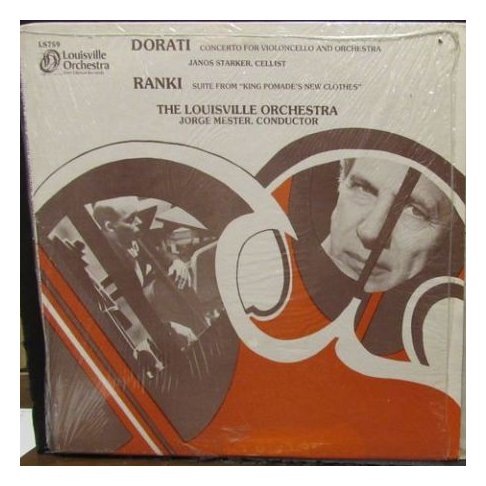A Conversation with Bruce Duffie
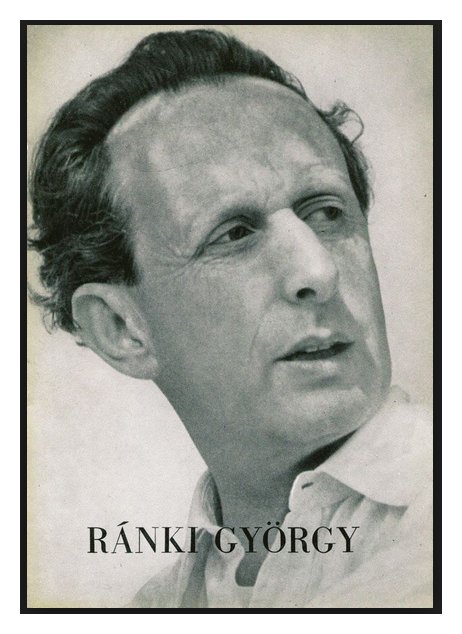
This interview with composer György Ránki is a very special one in my catalogue. Nearly unique among the 1600+ conversations I have done, this one involved my sending a typed list of questions to the composer. The reason it worked so well is that the person delivering the inquiries was the composer's brother. William O. Ranki (1905-1990) lived in Chicago and enthusiastically enjoyed my programs on WNIB. We conversed on the phone a few times, and I suggested that he might be able to facilitate an "interview" for use on the station.
This piqued his interest, and the composer agreed to this arrangement. So when a family trip to Budapest was scheduled in the fall of 1986, I wrote out a series of questions and William acted as both interviewer and translator. He recorded the session and later made a translation of the responses for use on the station. Since his voice and that of his brother were similar, it was as though I was speaking directly to the composer! I explained it all to the radio audience, so there was no deception. Everyone knew what had transpired, and the comments from listeners were completely positive.
Naturally, being a once- or twice-removed experience, I could not follow up on any of the answers, and was unable at the time to elicit more than brief responses to my queries. Changes of direction were sometimes abrupt, but that comes from jotting down ideas and thoughts for my guest to make replies. It will seem somewhat different than the other interviews I have presented in this series, however I was delighted then and am pleased now to be able to share the thoughts and ideas of this creative artist.
A lengthy and detailed biography follows the conversation. Here is that encounter . . . . . .
Bruce Duffie: As a composer, what do you expect of the public which comes to hear your music?
György Ránki: I have no special expectations; the public should simply sit in and listen. If my music can awake attention, that's fine. If not, that's my fault. I am ready to take that risk.
 BD: For whom
do you write — is it for yourself, the
performers, a specific public, or whom?
BD: For whom
do you write — is it for yourself, the
performers, a specific public, or whom?GR: Never in my life have I written letters to myself. Similarly, my music — as a kind of human message — is addressed to others. It goes through the performers to the audience, to a possibly broad, not specific audience.
BD: Do you feel that the public expects every new work to be a masterpiece?
GR: The public has the right to expect the maximum. However, sometimes it can be satisfied and even made enthusiastic by productions of minimal value. Sometimes, misled by printed commentaries or because of other snobbish reasons, the public is inclined to deny having been bored by a concert. "Snobisme oblige," said Stravinsky. Nobody dares to say, "The King is naked."
BD: In your music, where is the balance between inspiration and technique?
GR: Technical elements play a rather secondary role in my music conception. Otherwise, even technique needs inspiration.
BD: Do performers find things in your music which you did not know were there?
GR: Sometimes they do. More often, I have to draw their attention to things which are there.
BD: Are you generally pleased with the performances and recordings of your music?
GR: Works, performances and recordings are never perfect. But I am pleased if the essential elements of my music — the message — comes through. In this case, I am not really careful about details of less importance.
BD: Do you feel that opera, which is a dramatic form, works well on purely aural recordings?
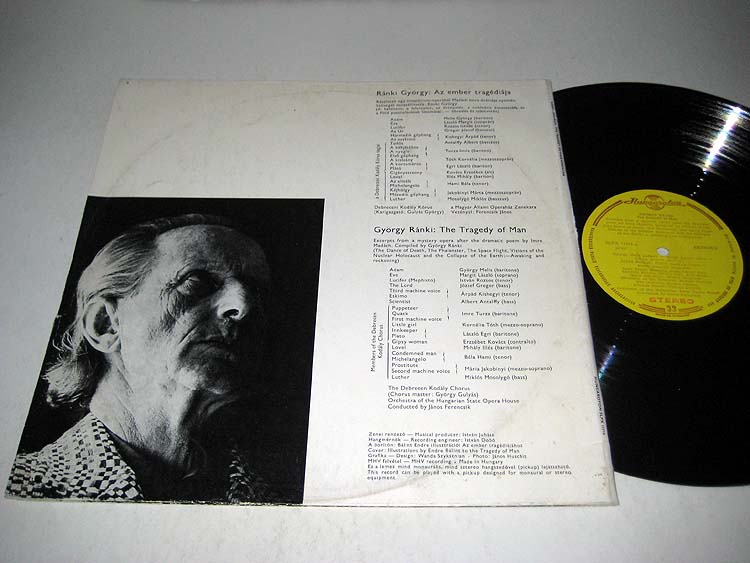 GR: Evidently,
purely aural opera recordings cannot be complete, but the missing
visual elements can be substituted by personal imagination of the
listener. Sometimes the result will be better than some real but
absurd opera staging.
GR: Evidently,
purely aural opera recordings cannot be complete, but the missing
visual elements can be substituted by personal imagination of the
listener. Sometimes the result will be better than some real but
absurd opera staging.BD: Are stage directors misusing old works, or even new works?
GR: Yes, here and there they are. This happens all over the world, sometimes in close cooperation with the choreographer.
BD: Should your operas be done in translation when they are presented outside of Hungary?
GR: My mysterio-opera The Tragedy of Man could not be understood in foreign countries without translation because of its philosophical content. Fortunately, I am in possession of good English and German translations of it.
BD: Where is opera going today?
GR: First tell me where the world is going today!
BD: Are you optimistic about the future of opera?
GR: I feel the opera still has rich latent possibilities, and could produce new masterpieces — if the circumstances would be more favorable than they are now.
BD: Have performers gotten significantly better in the last thirty, forty, fifty years? And if they are technically better, have they improved musically?
GR: Both musically and technically, the average level of music performing art seems to be much higher and broader than before. This is probably due to the growing need for new performers, ad to the fact that young performers can profit lots and lots from the recordings of master-performances which are available for everybody. It is a pity that this comfort spoils some conductors; they are going to forget the skill of reading scores.
BD: Is composition something that can be taught in schools, or must if be self-inspired?
GR: The ability of composing is supposed to be an inborn talent and cannot be taught. But how to use this ability could be learned under a good master.
BD: Are contests for composers the right way of encouraging new works?
GR: Contests can be useful in any field of human activity. Of course, it is only one way among many others, as is studio work, group activity, etc.
BD: Are there enough — or perhaps too many — young composers today?
GR: There are really very many young composers. I wonder how many of them have been really born for composing music.
BD: What advice do you have for a young composer or performer?
GR: Be faithful to good music. You know exactly what that means!
BD: Is there a "nationalism" to music?
GR: Music can be universal, even if it contains national elements.
BD: Is your music particularly Hungarian?
GR: I hope the style of my music is more or less personal, independent from nationalism, serialism, avant-garde or other famous streams of our century. Because of its comprehensible modernity, my music could be called "neo-normal."
BD: Do you consider jazz to be music? Or rock-n-roll?
GR: I feel that jazz is a much-promising, attractive, sometimes artistic trend of music, but I think rock-n-roll is more "decibel terrorism" and "musical dope-business" than music.
BD: Is music art or entertainment, and where is the balance?
GR: It would be better to make a distinction between "art music" and "industrial music for mass entertainment."
BD: What is the ultimate purpose of music in today's society?
GR: It is identical with the ultimate purpose of today's society — survival!
BD: What did you learn from Kodály?
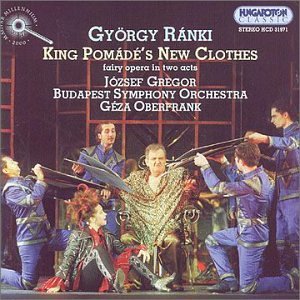 GR: Really very
much in many fields. Far from any dogmatism, Kodály has
given freedom to his pupils to improve their personal style in
music. He used to say, "Plants can grow only in their own
roots." He was an unforgettable master, composer and scientist.
GR: Really very
much in many fields. Far from any dogmatism, Kodály has
given freedom to his pupils to improve their personal style in
music. He used to say, "Plants can grow only in their own
roots." He was an unforgettable master, composer and scientist.BD: Who are the musical masters of yesteryear that you admire most?
GR: Kodály, Bartók, Stravinsky, Prokofiev, and Ravel.
BD: Are there living composers who can be placed alongside of these established masters?
GR: "That will be answered by time and the people." This is another Kodaly quote.
BD: Tell me just a bit about some of your works which have been recorded, and/or those which are most often performed.
GR: My music could be divided in two contrasting categories — comedy and tragedy. My most often performed work is the First Orchestral Suite from King Pomade's New Clothes, which is based on my comic opera after Hans Christian Andersen. For thirty years, this work has been played in the concert halls of four continents. It has been performed many times in the U.S. under not less than five conductors. One of them, Jorge Mester, recorded it with the Louisville Symphony Orchestra. [Record jacket shown below.] Some other "globetrotter" works include Pentaerophonia which is a woodwind quintet; The Tragedy of Man, a mysterio-opera; Circus, a symphonic dance-drama; Three Historical Tableaux for orchestra, piano and choir; First Symphony; Concerto for Hungarian Cimbalom and Orchestra; Concerto for Viola and Orchestra; Raga di Notte for Violin and Orchestra; Two Wonder Oxen, a tale with music; The Magic Drink — two orchestral suites from my ballet-comedy; Second Symphony; Quo Vadis for Narrator, 23 Winds and Choreography; and The Serenade of the Seven-Headed Dragon, which is a musical joke for brass septet. My String Quartet will have its world premiere in Arizona in 1988. Of course, this list is not complete . . .
BD: Thank you for being a composer!
GR: Thank you, Mr. Duffie, for your inspiring questions.
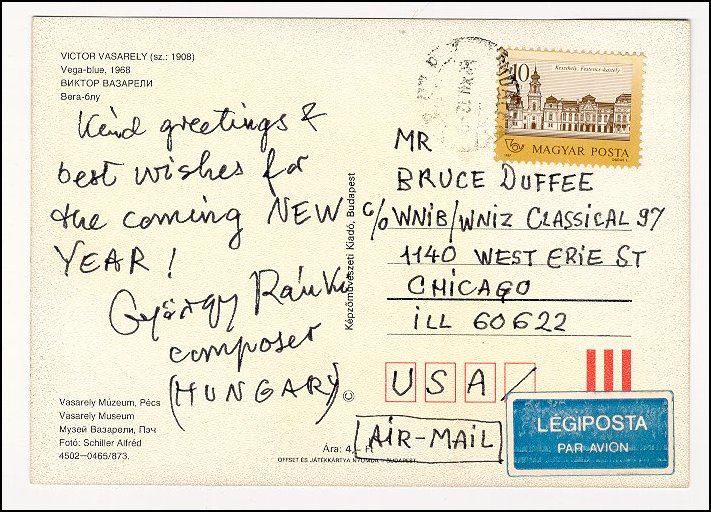  |
| György Ránki was bom
György Gaszton Reisz in Budapest on 30lh October 1907 into an
intellectual rniddle-class Jewish family. His father Dr. Frigyes Reisz
was a chemical engineer, his mother Szidónia Honig brought up
their three children, Vilmos, György and Frigyes During his childhood, György received the basic musical education typical in bourgeois families: he took piano lessons. It was during his years at the Royal Catholic University Secondary School of the city's 1st. district (between 1917 and 1925) that he took a more serious interest in music. This was when, with his friend and school-mate Sándor Veress, who was to remain a good friend until his emigration to Switzerland, he discovered and began to study the music of Bartók and Kodály. Encouraged by Antal Molnár, after secondary school and a year at technical university, he took the entrance examination for the composition faculty at the Liszt Ferenc Academy of Music. Between 1926 and 1930 he was a pupil of Kodály. The years under his guidance were an important experience in his life. Ránki gives the following account of this influence: " ... what he said was advice for life. His method was to encourage autonomy and form the character. He made his students stand on their own two feet, and taught them to be independent and unconditionally truthful in their music. " Ránki's relationship with Kodály continued even after he had graduated. He visited his teacher once or twice a year and showed him his new compositions. The most important musical influence for him as a composition student at the academy was the closer acquaintance with new Hungarian music and folk music, as well as an acquaintance with the jazz world. In 1931, after graduating, the young composer sought to make a name for himself at 'New Music' composers' evenings, which were organized with his colleagues Sándor Veress, Pál Kadosa, Ferenc Szabó, and Ferenc Farkas, although during this decade he made his living primarily from film music and commissions received from Budapest's National Theatre. It was a piece of stage music written for the National Theatre which brought about his first success abroad. The incidental music written in 1935 for Goldoni's "The Liar" was used for its own production in 1936 by Vienna's Burgtheater. While working at the National Theatre, Ránki met the excellent choreographer Aurél Millos, who awakened his responsiveness to dance. It was a friendship that was to last. Their joint work, the ballet "Snowmen" became a significant success abroad. lts Hungarian premiere in 1938 was followed by a performance in London in 1939. At the time of this performance, however, Ránki's name was not entirely unknown in British musical life. Because the situation at home was becoming ever more hopeless, the young composer went to London in the autumn of 1938 in the hope of finding work. There he received commissions from the film producer John Halas to compose musie for animations, and, with the help of Mátyás Seiber, another pupil of Kodály, his "Hungarian Dance Suite" was published by Schott. The months spent in England were followed by a study trip to Paris. There Ránki, under the guidance of André Schaeffner, participated in the cataloguing of the collection of the folk music of the Far East at the ethnomusicology department of the Musée de l'Homme, and he had also the opportunity to study the melodies. Acquaintance with this newer musical horizon played a decisive role in his compositional development, the influence of exotic music accompanying the whole of his life's work. Ránki's studies in Paris were interrupted by the war. In the autumn of 1939 the composer returned to Hungary, and the following period was the most difficult of his life. Although his parents had had him baptized at the age of four and he was from this point on officially Calvinist, and his surname was changed to Ránki in 1914, this - as was the case with so many of his fellow sufferers - did not save him from the legalized persecution of Jews. During the war years, he was only able to make a living as a composer by doing "ghost work" (composing in someone else's name), writing film music, and from commissions to orchestrate other composers' works. Occasionally, he played the piano in the orchestra of the Operetta Theatre. Apart from this, he worked unpaid alongside Kodály classifying folksongs at the Hungarian Academy of Sciences. Under these difficult circumstances and in a period when professional life was made impossible - perhaps in defiance of this - Ránki decided to start a family, marrying Anna Dékány, teacher of eurhythmics in 1940. His daughter Katalin was born in 1941, his son András in 1944. In 1943-44 and at the beginning of 1945, he was summoned to do forced labour several times. A number of his manuscripts were lost at the time of the siege of Budapest, but he himself - as his autobiographical "Ah, Carpathian Ukraine" testifies - was saved from deportation by the end of the war. The post-war years provided the composer with the chance of a new beginning. For a short period (1947-1948) he was head of the music department at Hungarian Radio. Then, while conditions at home permitted, he tried to revive his professional connections abroad, which had been severed by the war. During his second trip to England, at the end of 1948 and the beginning of 1949, Ránki again worked primarily on film music commissioned by Halas. However, some of his letters to his wife reveal that he was occupied with a film subject of his own, and other smaller works. After returning to Hungary, Ránki became more and more popular as a composer, fulfilling commissions for theatre, radio and cinema. These enabled him to work as a freelancer, making his living entirely by composition until the end of his life. His real soaring into eminence was brought about by his opera "King Pomádé's New Clothes" (1952), which not only brought him professional recognition, but also earned him the Kossuth Prize in 1954. Due to his growing popularity and to the witty satirical tone of his most successful works, the image of Ránki as a 'popular musical entertainer' gradually took shape. To balance this, Ránki consciously changed direction at the beginning of the 1960s. This is demonstrated by the piece "1514- fantasia for piano and orchestra" (1961). At the same time, he continued to be occupied by the 'playfulness' of musical expression. Fellow composer and close friend József Romhányi played a part in this, who, with his witty virtuoso style he can almost be regarded as the composer's alter ego. Among other things he wrote the librettos of "New Adventure of Péter the Musician" and "Ultiopera" (1962). Writing music for the stage and for the cinema also continued during the decade. After the success of the "Swansong" film music (1963), Ránki bought a summer house in Balatonföldvár which he named 'Villa Negra' after the hit "The Romance of Villa Negra" from the film, and which became his favourite place to work. It was here that he completed his ballet "Circus" in 1965, a work of great significance in his oeuvre. One of the composer's biggest failures was when a personal conflict with the choreographer László Seregi blighted the premiere of this piece at the Opera House - despite there being a contract. At the time, the incident known as the 'Circus affair' stirred up a small storm in professional circles. Finally, amends were made by the Pécs Ballet, who staged the work in 1966. (Five years earlier the ensemble had also prepared the choreography for "1514".) The vicissitudinous fate of "Circus" did not deter Ránki from bringing the long-cherished plan of a large-scale opera to fruition. The composition, which is considered to be his masterwork, "The Tragedy of Man," was originally intended to be a trilogy, but he changed this plan, and it became a two-act mystery opera. He worked on the piece between 1967 and 1970. The premiere was planned for the 1969 Szeged Open-Air Festival, but in the end, due to the writing taking rather longer than was anticipated, it took place only in 1970, at the Opera House. The reception was mixed. Ránki recalls, 'The performance excited many people.... Letters both appreciative and abusive poured in." While the German musicologist and critic Hanns Heinz Stuckenschmidt spoke appreciatively about the work, the Hungarian critiques were damning. For a long time after the completion of the large-scale opera, Ránki produced only smaller compositions. The oriental trips which provided him with new compositional impulse regenerated him. In 1971 he travelled to India, and in 1973 to Vietnam. The musical recollection of the first trip is reflected in the "Ragadi notte" (1974), the second in the chamber works using elements of Vietnamese folk music. The next significant stage in Ránki's creative carrier was Wiesbaden, where - after its mixed reception at home - the premiere of his ballet "The Magic Drink" (1975) was a resounding success. The work was commissioned by the Ressisches Theater in Wiesbaden. The composer took such a liking to the libretto based on Zola's short story "Coqueville on a Spree," that he composed his ballet-comedy in a mere three months. Ránki was now almost 70, and his creative powers received new impetus. He completed his "Symphony No. 1" by his 70th birthday, and this work was followed by the "Cimbalom Concertino" (1978) and the "Viola Concerto" (1979). His vocal output increased with the opera "The Boatman of the Moon" (1978) and the monodrama "Leverkühn's Abschied" (1979). In 1980 he continued his oriental travels, going to Japan. His 75th birthday was celebrated by a composers' evening at the Academy of Music, and his 80th by one there and also at the Fészek Club. The press also congratulated him on his 80th birthday. The composers' concert held on 18th October 1987, which included important new works (the "Psalm for Children's Voices" written in 1984, and two others dating form 1987, "Two Spirituals" and the "Overture to the 21st Century") received a very favourable press. The appreciation was also shown by the awards he received: in 1987 the Bartók- Pásztory Award, and in 1988 the Outstanding Artist Award. In the same year, Ránki set out on his fourth and final joumey to the Orient, this time to China. During his last years his health deteriorated, but he remained active almost to the end. His final work "Jesus' Lament" was composed in 1991. György Ránki died on 22nd May 1992 of cancer of the frontal cavity. -- Biography (edited) from
the website of Stormworks-Europe Music Publishers
|
© 1986 Bruce Duffie
This interview was held in Budapest, Hungary, on October 9,
1986. My questions were submitted in writing, and the composer's
brother, William, asked them. William later translated the
responses and recorded them for use on WNIB. Portions (along with
recordings)
were used on WNIB in 1987, 1992 and 1997. William also made the
transcription which was posted on this
website early in 2012.
To see a full list (with links) of interviews which have been transcribed and posted on this website, click here.
Award - winning broadcaster Bruce Duffie was with WNIB, Classical 97 in Chicago from 1975 until its final moment as a classical station in February of 2001. His interviews have also appeared in various magazines and journals since 1980, and he now continues his broadcast series on WNUR-FM, as well as on Contemporary Classical Internet Radio.
You are invited to visit his website for more information about his work, including selected transcripts of other interviews, plus a full list of his guests. He would also like to call your attention to the photos and information about his grandfather, who was a pioneer in the automotive field more than a century ago. You may also send him E-Mail with comments, questions and suggestions.